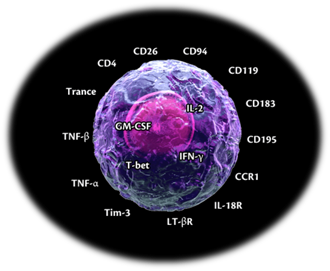How to Identify Your Favorite Cells
| If you're brand new to the field of immunology, you're probably going to have to learn a lot of new information…and fast. And chances are, your lab is focused on a particular cell type. You're probably asking yourself, "How do we tell these cells apart? How do I identify the cell we want to study? Also, what the heck are all these strange CD things my PI keeps yelling at me?" | ||
| Turns out, scientists agreed back in 1982 to use something called "CD nomenclature." CD stands for Cluster of Differentiation and is intended to help identify a marker or epitope on cells. CDs are assigned once a marker is found to have two specific, monoclonal antibodies that recognize it. If the marker is not as well-defined or only has one monoclonal antibody that recognizes it, it is designated with a "w" (i.e., CDw293). Cells that express a CD are denoted by a "+". If a cell doesn't express a marker, it's assigned a "-". In this manner, cell types can be phenotyped based on the markers they do or do not express (Human Natural Killer cells can be CD3- , CD16+, CD31+, CD30+, CD38+, CD56+). | ||
| Of course, there is a whole host of other markers that can help identify cells that may not contain the "CD" name. Cytokines, transcription factors, and other markers may have different naming conventions. To help keep all these items organized, you may want to take a look at these useful resources: Cell Markers page: A handy tool for the most common cell types that shows you markers and background information. We even have a useful mobile app version of this page for iPhones! Check them out here. |
 |
|
| Maturation Markers page But of course, it'd be too easy if cells were static and unchanging. Cells will mature and change into different stages as they develop. This page helps you keep track of what gets upregulated on T cells, Tregs, B cells, monocyte/macrophages, and dendritic cells. Plus, it has cool Game of Thrones-related artwork! |
||
| Finally, this last website is a good resource for your more exotic cell types: https://www.antibodybeyond.com/reviews/cell-marker-reviews.htm |
||
| Have any comments for us? Contact us here. | ||
 Login / Register
Login / Register 






Follow Us